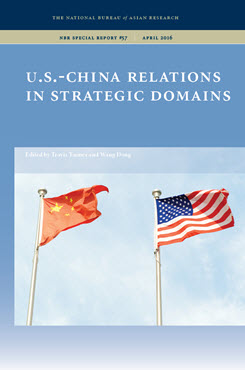Reducing and Managing U.S.-China Conflict in Cyberspace
This essay examines the increasing importance of cyberspace in the U.S.-China relationship and assesses the significant differences between Beijing and Washington over cyberattacks, Internet governance, and the security of supply chains and information and communications equipment.
EXECUTIVE SUMMARY
MAIN ARGUMENT
Despite the gaps in their views on Internet governance, cyberattacks, cyberespionage, and how to secure supply chains and information and telecommunications equipment, as well as the hyperbolic rhetoric that often shows up in the media in both countries about cyberwar, Chinese and U.S. policymakers appear committed to not letting cyber issues derail the U.S-China relationship or interfere with cooperation on other high-profile issues. Beijing and Washington seem to agree that continued cooperation on other issues such as economic growth, regional stability, and climate change should not be held hostage to cyber issues and that there is still a realistic prospect that the two sides can build greater collaboration. Both countries share a number of concerns, including addressing threats to critical infrastructure, stopping the proliferation of cyberattack capabilities to nonstate actors, and securing global supply chains. While the two governments have vowed to clarify responsible behaviors through bilateral and multilateral discussions, identifying common ground and cooperative projects is necessary to reduce tensions in cyberspace.
POLICY IMPLICATIONS
In order to manage conflict in cyberspace, China and the United States should pursue the following actions:
- Follow up on the September 2015 agreement on fighting cybercrime and cyber-enabled theft of intellectual property with concrete cooperation
- Ensure that discussions on norms of behavior in cyberspace continue at the highest level and are not suspended during times of tension
- Discuss joint measures such as intelligence exchanges to prevent the proliferation of cyber capabilities to nonstate actors
- Build cybersecurity capacity and expand cooperative research in universities and civil society
Adam Segal is the Maurice R. Greenberg Senior Fellow for China Studies and Director of the Program on Digital and Cyberspace Policy at the Council on Foreign Relations.
Tang Lan is Deputy Director at the Institute of Information and Social Development, China Institutes of Contemporary International Relations.


